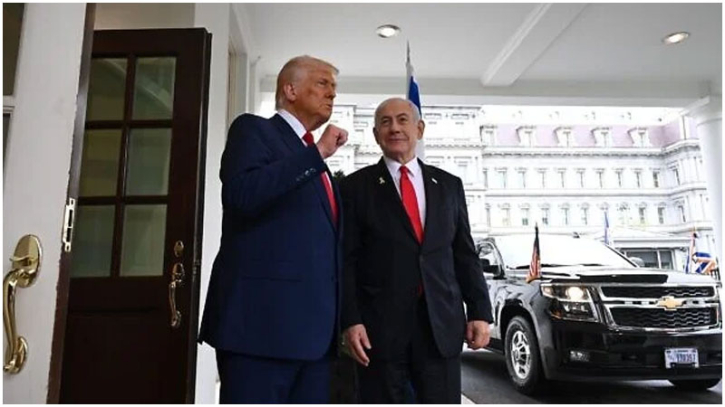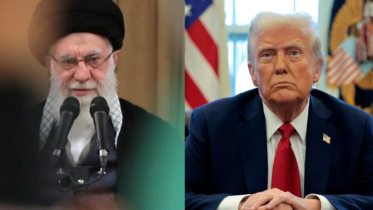Israel agreed to finalize Gaza ceasefire: Trump

US President Donald Trump announced Tuesday that “Israel has agreed to the necessary conditions to finalize” a 60-day ceasefire with Hamas in the Gaza Strip.
During the prospective two-month truce, “We will work with all parties to end the war,” Trump said in a Truth Social post, summarizing the development that came out of meetings top US officials held on Tuesday in Washington with visiting Strategic Affairs Minister Ron Dermer, Times of Israel reports.
Trump said Qatar and Egypt will deliver the “final proposal” to Hamas.
“I hope, for the good of the Middle East, that Hamas takes this deal because it will not get better — it will only get worse,” Trump wrote.
There was no immediate comment from Israeli officials on Trump’s post, which appeared to be referring to a proposal for a temporary ceasefire that has been discussed over the past several months. Those talks have been at an impasse, largely over the terms for what happens at the end of that truce, with Israel demanding that it maintain the ability to resume fighting, while Hamas seeks for the temporary ceasefire to become permanent.
In declaring that he will “work to end the war,” Trump apparently was trying to appease both sides, mentioning an end to the war without speaking definitively.
Despite the announcement from Trump, an official from one of the Arab mediating countries told The Times of Israel that major hurdles remain and that the sides will still need to hold proximity talks in order to close remaining gaps.
Two Arab diplomats from mediating countries told The Times of Israel that remaining sticking points also include Hamas’s demand for a return to old mechanisms for distributing humanitarian aid or the establishment of a new system to replace the current one managed by the Gaza Humanitarian Foundation. Israel says GHF is essential in preventing the diversion of aid by Hamas, but the US- and Israeli-backed system has forced Gazans to walk long distances in order to pick up food, while also crossing IDF lines, coming under deadly fire on a near-daily basis.
Meanwhile, Hebrew media outlets offered conflicting reports on whether Prime Minister Benjamin Netanyahu was prepared to compromise.
Channel 12 reported that he is, while Channel 13 quoted him as having said during a security cabinet earlier this week that “we need to kill every person that holds a weapon. Nothing less than this.”
Netanyahu is scheduled to visit the White House next week, Trump saying earlier Tuesday that he will be “very firm” with the prime minister on the need to end the war in Gaza. Trump also repeated his prediction that a ceasefire and hostage release deal would be reached shortly. “I think we’ll have a deal next week,” he said.
Ahead of Netanyahu’s trip, discussions were held Tuesday at the Prime Minister’s Office on the efforts to reach a hostage release deal, with reports of some progress.
“There is a positive dynamic and lively activity on the issue of negotiations,” a senior official told The Times of Israel.
While in the US, Netanyahu said will also meet with Vice President JD Vance, Secretary of State Marco Rubio, Defense Secretary Pete Hegseth, US Special Envoy to the Middle East Steve Witkoff, Commerce Secretary Howard Lutnick and senior lawmakers.
Strategic Affairs Minister Ron Dermer, who is currently in Washington ahead of Netanyahu’s visit, was slated to meet with Witkoff, Rubio and Vance.
Hostage-ceasefire talks are being mediated by Witkoff, whose latest proposal, the authenticity of which was confirmed to The Times of Israel by two sources familiar with the negotiations, would see Hamas release 10 living Israeli hostages held in Gaza and return the bodies of 18 deceased hostages during a 60-day ceasefire. The rest of the hostages would be released if a permanent ceasefire is reached.
Hamas sources told the London-based Al-Sharq Al-Awsat that the terror group’s response to Witkoff’s deal proposal was generally positive, though with conditions.
A source directly involved in the negotiations told The Times of Israel that Hamas’s response included a demand that makes it more difficult for Israel to resume fighting if talks on a permanent ceasefire are not completed by the end of the 60-day truce.
The source said there were other changes Hamas wanted to make to the Witkoff proposal, adding that it would require a more drawn-out negotiation process.
The updated proposal submitted by Hamas envisions the release of the 10 hostages being more spread out throughout the truce, rather than in two batches on the first and seventh days, as the US offer envisioned.
The source said this change was aimed at preventing Netanyahu from abandoning talks on a permanent ceasefire after the hostages are released, or refusing to engage in them altogether, as he did during the previous ceasefire in January.
Netanyahu told hostages’ families in May that he approved of Witkoff’s proposal in principle.
Terror groups in the Gaza Strip are holding 50 hostages, including 49 of the 251 abducted by Hamas-led terrorists on October 7, 2023. They include the bodies of at least 28 confirmed dead by the IDF. Twenty are believed to be alive and there are grave concerns for the well-being of two others, Israeli officials have said. Hamas is also holding the body of an IDF soldier killed in Gaza in 2014.
.png)




